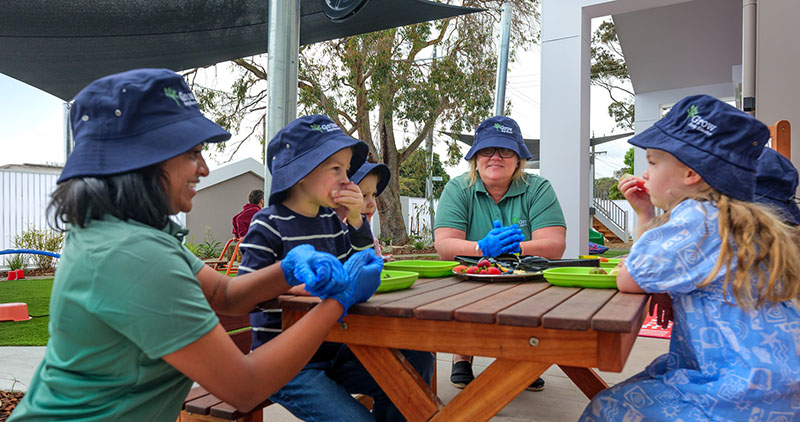Play dough has been a staple in an early childhood setting for decades and there is a good reason why! Play dough is a great tactile resource, holding a number of benefits including encouraging creativity in Kindergarten, boosting fine motor skills in Junior Kindy, and discovering new senses with Toddlers.
As an incredibly loved resource for both children and Educators, play dough is often used for free play time and scheduled learning activities. During this blog, we will be sharing the many ways we find joy in using play dough across our Grow Early Education centres and share some insight on how you can replicate our play dough recipe and learnings in a home setting.
How to make your own home-made playdough!
What is needed:
Measuring cup
Mixing spoon
Tbsp
Mixing bowl
1/2 cup table salt
1 tbsp of oil
Food colouring
1 cup of flour
2 Tbsp cream of tartar
1 cup of water
Instructions:
- Combine flour, salt, and cream of tartar together in a bowl.
- Mix well with mixing spoon.
- Add in the oil and mix together.
- Add food colouring and water together in a separate bowl.
- Once the colour has spread in the water then add the now coloured water into the other bowl combining all ingredients together.
- Mix all ingredients together with a mixing spoon.
- Once the mixture becomes firm use hands to mix and finish blending together - this will enable it to become more of a dough texture.
- Place on the table for the children to use.
Using this recipe as your play dough base, you can get creative and add your own variations to build on the sensory elements. Try adding a few drops of essential oils to discover new smells or add herbs to further develop the sensory aspect of texture and touch.
Across our Grow Early Education centres, there are a number of ways that our Educators incorporate play dough into our educational programs.
- Pattern Reognition
The Kindergarten children at our Grow Early Education Darling Heights centre used play dough as the base to their pattern making as a part of their introduction to pattern recognition. Pattern recognition in early childhood education refers to the ability young children have in identifying, understanding, and predicting sequences in their environment. It is a fundamental skill that lays the ground work for more complex problem-solving and mathematical solutions.
By adding the element of play dough and beads to this task, they are working on their fine motor skills, pincer grip skills, and hand-eye coordination.
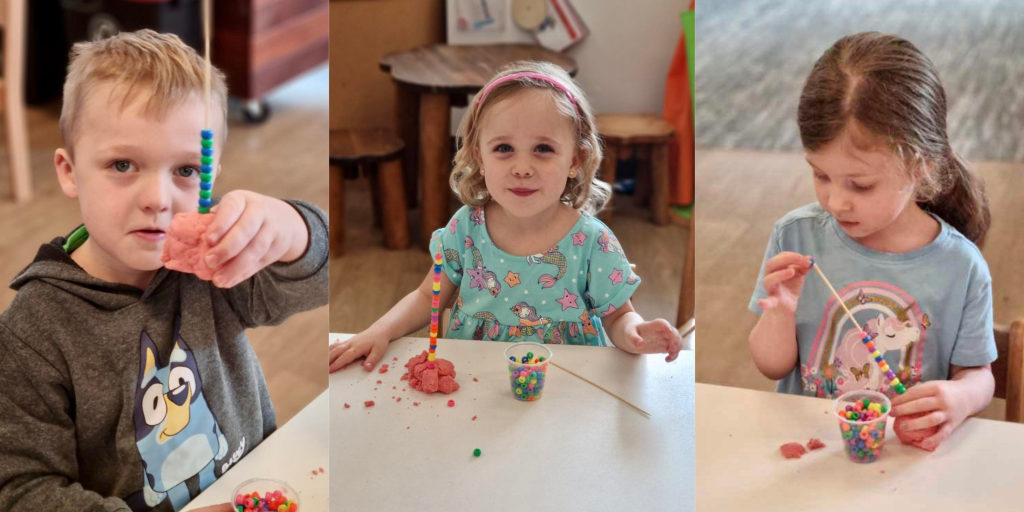
2. Indigenous Culture
The Toddler children at our Grow Early Education Riverton centre learnt about the temporary shelters traditionally used by Australian Indigenous Peoples as a part of the Toddlers introduction to Aboriginal and Torres Strait Islander cultures.
This by utilising play dough in this activity, it allowed the children to learn in a more hands-on way, while also encouraging further development of their comprehension, hand-eye coordination, and fine motor skills
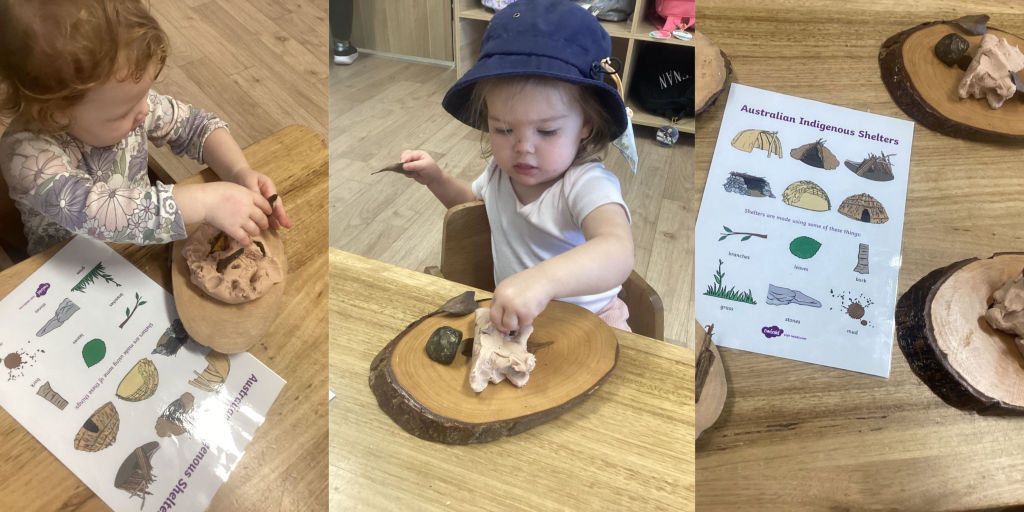
Our Educators often use play dough as a learning resource on significant and special days happening across the country.
Grow Early Education Bundaberg created their own versions of poppies as a part of the ANZAC Day learning, this is a great way to encourage inquisitive thinking as the children ask questions about the significance of the flower.
Grow Early Education Park Ridge used their own play dough recipe to create heart-shaped decorations as a part of their Valentines Day celebrations.
Grow Early Education Darling Heights used orange play dough to create different shapes as they celebrated Harmony Day across their centre.
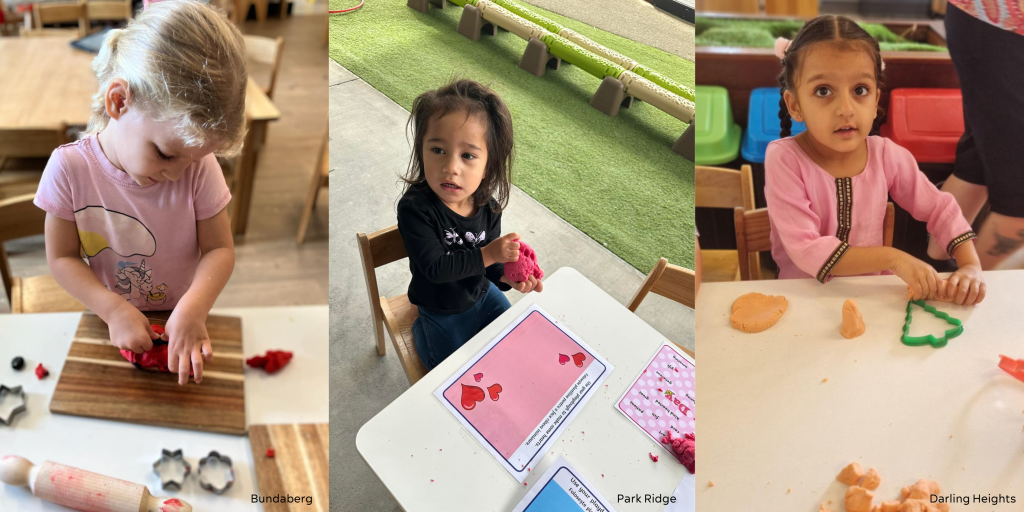
4. Educational Programming
Grow Early Education Bundaberg used play dough to create blue birds nests as a part of their discussions on the Bowerbird Blues book that was this year's pick for National Simultaneous Storytime.
This activity allowed the children to discuss certain parts of the book they enjoyed with their peers, while also talking about what they know about birds and their nests.

By making your own play dough, you provide a wonderful sensory experience for children and also create lasting memories through shared activities. We hope this guide inspires you to experiment with different textures and colours, and most importantly, to have fun. Stay tuned for more exciting tips and ideas to enhance your playtime adventures.
Find your own printable version of our home-made play dough here!
We would love to see your at home play dough creations, tag us in your creativity on Instagram @grow_early_education or on Facebook @growearlyeducation
As we bid farewell to 2023, it's time to take a moment and reflect on the journey we've collectively experienced over the past 12 months.
From opening eight new Grow Early Education centres, to triumphs in professional development for our team members, this year has been progressive with lots of lessons and growth.
We would like to take this opportunity to thank all our Grow families for choosing us for your child’s care and allowing us to celebrate educational and development milestones with your family throughout the year.
Join us now for the highlights and milestones that made this year truly progressive for our Grow family.
Our Growth
As we continue to support families across Australia, we are proud to say we opened eight new long day care centres this year and expanded our footprint in Queensland, New South Wales and Victoria.
We take enormous pride in delivering communities with a personalised approach to childcare through our local Early Childhood Teams, establishing community connections and empowering our centre management teams to raise the bar in early education.
Our new childcare centres and the local communities we are now part of include:
- Grow Early Education Riverton
- Grow Early Education Hervey Bay
- Grow Early Education Maroochydore
- Grow Early Education Dalby
- Grow Early Education Frankston
- Grow Early Education Bushland Beach
- Grow Early Education Heathmont
- Grow Early Education Nowra Central
We are also pleased to reveal that Grow Early Education Park Ridge will be opening early 2024!
Our Team
Passionate and caring, our Educators are the heart and soul of our childcare centres. They are dedicated to supporting every child on their individual learning journey, and ensuring their time in our care is a rewarding one.
In 2023, we employed 346 passionate early childhood professionals to nurture, educate and support the children in their care.
To ensure our Educators keep abreast with current developments and research in the area of early childhood education, Grow Early Education runs ongoing training and professional development programs across the year.
In 2023, we ran a robust training program which saw an incredible 351 courses delivered so our Educators have the most up-to-date knowledge and certifications.
Our Service
For the convenience and peace of mind of parents, we operate all-inclusive fee childcare centres. This means we have thought of everything children will need to thrive at our centres and included it in our daily fee, including nappies, wipes, sunscreen, meals and more!
In 2023, we supplied the following as part of our service offering:
- 378,573 Nappies
- 956,616 Baby Wipes
- 320 L of sunscreen (we take sun safety VERY seriously)
- 1,320 Hats and drink bottles were provided to families as part of our free enrolment packs
- 2,106,225 healthy and nutritious meals, all prepared by our Centre Chefs in our onsite kitchens
Another one of the amazing benefits we provide as part of our daily fee are extracurricular activities. In 2023, we organised 1,040 extra-curricular classes, with popular activities at our centres being multi-sport classes, music and movement, Japanese lessons, children’s yoga, cooking and gardening lessons.
Whilst we’re here to nurture the children in our care, our free barista coffee was there to care for our parents! Drumroll please… in 2023 we made over 38,254 barista coffees for our Grow parents to enjoy!
Our Families
We view parents and families as invaluable collaborators in a child’s educational journey. Open, transparent, and collaborative communication is fundamental to creating a supportive and enriching experience for every child.
A strong partnership establishes a crucial bridge between home and early education, fosters holistic development and also contributes to a child's sense of belonging and security. In 2023 we were fortunate to partner with 1,356 amazing families and inspire 1,665 little ones to learn and grow!
Again, we would like to thank our Grow families for entrusting us with your child’s education and care. We wish everyone a safe and happy holiday season and we look forward to sharing this wonderful learning journey again with you all in 2024.

The holiday season, particularly Christmas, holds a special place in our hearts. It's a time for reflection, gratitude, and it’s also a chance to extend a helping hand to those less fortunate.
This sentiment is widely shared among Australians, as evidenced by the significant number of people planning to contribute to charitable causes this Christmas (47%). This makes the holiday season an optimal period for our childcare centres to perform philanthropic activities and community support work.
Since 2014, our Grow Early Education Centres have actively participated in the Salvation Army Christmas Appeal, or selected local charities to support. This annual tradition serves as a valuable connection to our local communities, fostering a sense of unity and shared responsibility.

In November of this year, we launched the Grow Early Education 'Annual Christmas Food and Toy Drive.' This initiative involved selecting charities, creating donation hampers, and gearing up for the generous contributions of books, toys, and non-perishable food items.
While supporting the Salvation Army and their Christmas Appeal remains a priority, some Grow Early Education centres have chosen to back other not-for-profits, such as Angel Paws, Ronald McDonald House, Give a Little Hope, Defenders for Hope, and Act for Kids to name a few.

With our childcare centres spread across Australia in Queensland, Victoria and New South Wales, each hosting their own Christmas Appeal, the collective efforts of the Grow Early Education childcare centres can make a significant and positive difference.
Moreover, our Annual Christmas Food and Toy Drive demonstrates our commitment to making a positive impact locally and instilling a sense of community contribution in children. It serves as a crucial opportunity to initiate and expand conversations about generosity and gratitude with the children in our childcare centres.
At Grow Early Education, we firmly believe that it's never too early to instil the value of giving back in little ones. Nurturing generosity and teaching children about the significance of charity from an early age empowers them to have a meaningful impact on the lives of others.

For parents wondering how to introduce charity to their children, simple actions like dropping money into charity boxes, involving them in selecting canned foods for a drive, or taking them to fundraising events can be impactful. Plus, these moments offer an opportunity to discuss the importance of giving and the joy it brings.
If you're interested in joining your local Grow Early Education centre's Christmas Appeal, there's still time to get involved. You will need to be quick though, as donations and hampers are set to be collected by December 12th from all centres!

In the ever-evolving landscape of education, early childhood Educators are tasked with shaping the minds of the future generation.
This responsibility goes far beyond imparting knowledge; it involves fostering critical thinking, empathy, and adaptability. One powerful tool that aids in this process is critical reflection.
At Grow Early Education, we believe that it is vital for all staff to continuously and critically reflect on our practices and our curriculum to benefit the children’s interests and needs. The voice of the child and the voice of the parent are main components that influence our critical reflections and promotes ongoing learning.
In this blog, we will explore the significance of critical reflection in early education and understand why at Grow Early Education, we believe it is indispensable in nurturing young minds for a brighter future.

Promoting Deep Learning
Critical reflection encourages deep learning by prompting Educators to delve into the ‘hows’ and ‘whys’ of their teaching methods. By questioning their approaches, Educators can identify what works best for the children and adapt their strategies accordingly.
This reflective practice goes beyond the surface, allowing Educators to understand the underlying principles of early education and tailor their methods to meet the diverse needs of the children in their care.
Enhancing Self-Awareness
Critical reflection enhances self-awareness among Educators. It encourages them to examine their beliefs, biases, and values, which can significantly impact their teaching styles. By recognising their own predispositions, Educators can create a more inclusive and supportive learning environment. Self-aware teachers are better equipped to identify areas of improvement and continuously work on refining their teaching techniques.
Fostering Problem-Solving Skills
Incorporating critical reflection in early education nurtures problem-solving skills among both Educators and children. When Educators critically reflect on their teaching practices, they can identify challenges faced by their children.
By encouraging children to reflect critically on their own learning experiences, Educators empower them to become active problem solvers. This skill is invaluable for real-life situations.
Encouraging Lifelong Learning
Early education is the foundation upon which a child's lifelong learning journey is built. At Grow Early Education, we understand that children learn in different ways, and therefore we support each individual child’s learning needs, ensuring that every child feels and experiences success and accomplishment. Through this process, we aim to inspire all children and instil a love for learning that they will take with them through life.
Critical reflection instils a sense of curiosity and a love for learning. Educators who engage in reflective practices are more likely to seek out new teaching methodologies, educational theories, and research findings.
This continuous pursuit of knowledge creates a dynamic learning environment that stimulates young minds and prepares them for a future where adaptability and continuous learning are key.
Promoting Empathy and Understanding
Critical reflection encourages empathy and understanding among Educators. By reflecting on their teaching methods and the outcomes, Educators develop a deeper understanding of the children's perspectives, needs, and challenges.
This understanding allows them to tailor their teaching approaches, ensuring that every child receives the support they require. In turn, children learn empathy by reflecting on different viewpoints and experiences, fostering a compassionate and inclusive learning community.

In the realm of early education, critical reflection serves as a guiding light, illuminating the path towards a more effective, empathetic, and inclusive teaching practice.
By promoting deep learning, enhancing self-awareness, fostering problem-solving skills, encouraging lifelong learning, and nurturing empathy, critical reflection paves the way for a generation of young minds that are not just academically proficient but also compassionate, adaptable, and open-minded.
Grow Early Education will continue to champion critical reflection in early education, investing in a future where every child has the opportunity to thrive and contribute meaningfully to the world.
Say hello to carrots, capsicum and cauliflower! From October 15th to 21st 2023, it’s time to pay tribute to vegetables and the important role they can play in our health and wellbeing.
Nutrition Week is all about encouraging Australians to learn about making healthy food and lifestyle choices to improve their overall health.
As an early education and childcare provider, we play a big part in shaping many children's eating and drinking habits. At Grow Early Education, we take this responsibility seriously as developing healthy habits in childhood also leads to healthier decisions, actions and habits throughout life!
A child’s physical and mental development depends largely on the nutrition they receive during their formative years. Proper nutrition is essential for children’s health, development, and wellbeing. It helps them grow, learn, and build strong immune systems. A balanced diet that includes a variety of nutrient-rich foods is the key to optimal health for children.
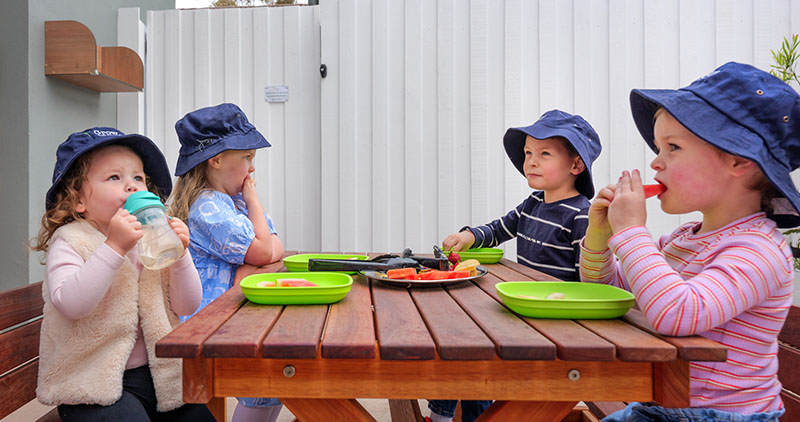
At Grow Early Education it is our priority to work with families to support and encourage healthy eating for children in our care. We provide nutritious and super delicious meals every day for your little one to enjoy and this is included in our daily fee.
Our centre menus, prepared by professionally qualified Chefs are age and development appropriate and include a wide variety of nutritious food of different tastes and textures consistent with the Australian Dietary Guidelines.
We also use seasonal and local produce and ensure that our menus provide more than half a child’s daily nutrition requirements!
At Grow Early Education, we recognise the important role we have in promoting healthy eating and good food choices to the children in our care. We proactively do this by using the following strategies:
- Engaging children in activities based around creating healthy menus and cooking experiences with our Chefs. This includes providing cooking classes as an extra-curricular activity, which is included as part of our daily fee.
- Promoting mealtime routines and foods from different cultures, to expand children’s experience with different foods.
- Engaging in conversations about nutritious food and making healthy food choices with children during mealtimes.
- Modelling healthy eating practices and leading by example during mealtimes.
- Making mealtimes happy, social and pleasant occasions, where conversations around healthy food choices and nutrition are encouraged.
- Promoting ‘Paddock to Plate’ by growing a range of delicious vegetables, herbs and fruits in our gardens, which the children help to grow and harvest to use in our centre meals. This is part of our gardening lessons as an extra-curricular activity included in our daily fee.

Wondering how you can get involved?
Check out Nutrition Australia’s ‘Try for 5’ website at www.tryfor5.org.au.
‘Try for 5’ is an annual awareness campaign by Nutrition Australia during National Nutrition Week in October that celebrates vegetables and the important role they can play in our health and wellbeing.
If you find it hard to get your little one to eat their vegetables, our hot tip is to head to the ‘Recipes’ section of this website. You are guaranteed to find one that suits your family’s tastebuds!
If you would like to know more about our approach to health and nutrition at our Grow centres, visit the Health & Wellbeing page of our website or call our team on 1300 934 769.
‘Good nutrition is necessary for the active growth and development that takes place in early childhood. Good eating habits and a well-balanced diet support children’s health and wellbeing, and minimise the risk of illness. Eating habits developed in the early years are likely to have a lifelong influence.’
(Get up and Grow: Healthy Eating and Physical activity for Early childhood p 20. 2013 Dept. of Health. Aust. Government)
